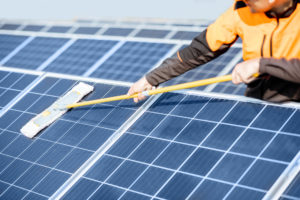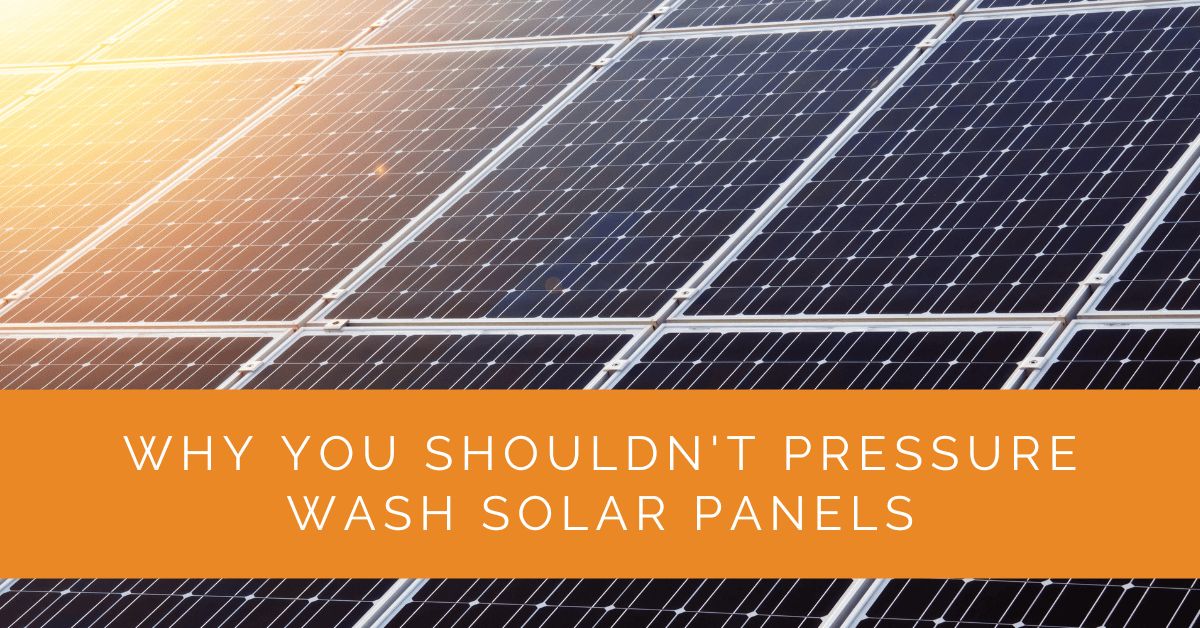Solar panels play a crucial role in harnessing clean and renewable solar energy. Keeping them clean is essential for optimal performance and energy production. However, pressure washing is not the recommended method when cleaning solar panels. This article will explore why pressure washing can harm solar panels and discuss safer and more effective cleaning alternatives. Let’s dive into the details and discover the best practices for keeping your solar panels clean and efficient.
Contents
- 1 Key Takeaways
- 2 Understanding Solar Panel Cleaning
- 3 The Risks of Pressure Washing Solar Panels
- 4 Alternative Methods for Cleaning Solar Panels
- 5 Best Practices for Cleaning Your Solar Panels
- 6 Maintaining Solar Panel Efficiency
- 7 Case Study: Maintaining Solar Panel Efficiency Through Safe Cleaning Practices
- 8 Expert Insights From Our Solar Panel Installers About Why You Shouldn’t Pressure Wash Solar Panels
- 9 Experience Solar Excellence with Us!
- 10 Conclusion
Key Takeaways
- Pressure washing solar panels can cause damage to the delicate surface and void warranties.
- Safer alternatives such as manual cleaning, gentle rinsing, and non-abrasive cleaning solutions are recommended.
- Regular maintenance and cleaning are essential for optimal performance and prolonging the lifespan of solar panels.
Understanding Solar Panel Cleaning
To fully grasp the importance of solar panel cleaning, it’s vital to understand how dirt and debris affect their performance. Solar panels are exposed to dust, pollen, bird droppings, and environmental pollutants that can accumulate on their surface over time. This buildup creates a barrier, reducing the amount of sunlight penetrating the panel and limiting energy production. Regular cleaning is necessary to maintain peak performance and maximize energy output.
The Risks of Pressure Washing Solar Panels
While pressure washing may seem like a convenient option for cleaning solar panels, it carries significant risks that can outweigh the benefits. Here are some reasons why pressure washing should be avoided:
- Damage to the Surface: High-pressure water can damage the delicate surface of solar panels, including the protective coatings, glass surface, and metal frame. The forceful water stream can cause scratches, cracks, or even compromise the vacuum seal of the panels, leading to moisture intrusion and potential electrical damage.
- Voiding Warranty: Most solar panel manufacturers advise against pressure washing, which can void the warranty. If any damage occurs due to pressure washing, you may be left responsible for the repair or replacement costs.
- Safety Concerns: Pressure washing solar panels on rooftops can be dangerous. Using high-pressure equipment while working on an elevated surface poses risks of slipping, falling, or damaging the roofing material. It is essential to prioritize safety when cleaning solar panels.

Alternative Methods for Cleaning Solar Panels
Fortunately, safer and more effective methods are available for cleaning solar panels. These methods ensure the panels are clean and protect their integrity and longevity. Here are some recommended alternatives to pressure washing:
Manual Cleaning
Using non-abrasive materials like soft brushes or microfiber cloths, manually remove dirt, dust, and other debris from the surface of the panels. Gently wipe the panels horizontally, being cautious not to apply excessive pressure that could scratch the glass.
Hose and Water Rinse
A gentle stream of water from a garden hose can effectively rinse loose dirt and debris from the panels. Start at the panel’s top and let the water flow, washing away any accumulated particles. Avoid using high-pressure settings on the hose nozzle to prevent potential damage.
Non-Abrasive Cleaning Solutions
You can use a mild, non-abrasive cleaning solution for stubborn stains or residues. Mix a small amount of detergent or soap with water to create a soapy solution. Apply the solution to a soft cloth or sponge and gently clean the affected areas. Rinse thoroughly with clean water to remove any soap residue.
Best Practices for Cleaning Your Solar Panels
To ensure effective and safe cleaning of your solar panels, follow these best practices:
- Time and Frequency: Clean your solar panels during the early morning or late afternoon when the surface is cooler to prevent rapid drying. Consider the local environment and weather conditions when determining the frequency of cleaning.
- Safety Precautions: Prioritize safety by turning off the solar panel system before cleaning. If your panels are installed on a rooftop, take necessary precautions, such as using a secure ladder, wearing appropriate footwear, and following safety guidelines.
- Professional Assistance: If you are unsure about the cleaning process or if your solar panels require specialized attention, it is recommended to seek professional assistance. Certified solar panel cleaning services have the expertise and equipment to clean your panels safely and effectively.
- Regular Maintenance: Incorporate regular maintenance into your solar panel care routine. Check for any signs of damage, loose connections, or debris accumulation. Addressing minor issues promptly can help prevent larger problems and ensure the long-term performance of your solar panels.
- Deionized Water: Consider using deionized water for cleaning your solar panels. Deionized water has been purified to remove minerals and impurities that may leave residue on the panel’s surface. This helps maintain a clean and streak-free finish.
- Avoid Abrasive Materials: When cleaning your solar panels, avoid using abrasive materials such as harsh brushes, steel wool, or abrasive cleaning agents. These can scratch the glass surface and damage protective coatings, compromising the panel’s performance.
Remember, the key to effective solar panel cleaning is a gentle approach that preserves the integrity of the panels while maximizing energy production.
Maintaining Solar Panel Efficiency
Regular cleaning and maintenance of your solar panels enhance their performance and prolong their lifespan. Clean panels can generate more energy and yield higher returns on your solar investment. Additionally, keeping your panels in optimal condition ensures they continue contributing to a cleaner and more sustainable energy future.
Case Study: Maintaining Solar Panel Efficiency Through Safe Cleaning Practices
Background
At Solar Panels Network USA, we emphasize the importance of maintaining solar panels for optimal performance. This case study explores the potential risks of pressure washing solar panels and highlights safer, more effective cleaning methods.
Project Overview
Our client, a homeowner with a rooftop solar panel system, was concerned about the accumulation of dirt and debris on their panels. They initially considered pressure washing but sought our advice on the best cleaning practices to avoid damaging the panels.
Implementation
Initial Assessment
We conducted an on-site assessment to evaluate the condition of the solar panels and determine the extent of dirt and debris accumulation. The panels had a noticeable layer of dust, pollen, and bird droppings affecting their efficiency.
Explaining the Risks of Pressure Washing
We explained the potential damage that pressure washing could cause to the solar panels, including:
- Surface Damage: High-pressure water can scratch the glass and damage protective coatings.
- Moisture Intrusion: Forceful water streams can compromise the vacuum seal, allowing moisture to enter and cause electrical issues.
- Warranty Voidance: Most manufacturers do not cover damage caused by pressure washing, leaving homeowners responsible for repair costs.
Recommending Safer Alternatives
We recommended the following safer cleaning methods to the client:
- Manual Cleaning: Using a soft brush or microfiber cloth to gently remove dirt and debris.
- Hose and Water Rinse: A gentle stream of water from a garden hose to rinse off loose particles.
- Non-Abrasive Cleaning Solutions: Mixing a mild detergent with water to clean stubborn stains, followed by a thorough rinse with clean water.
Cleaning Process
We demonstrated the manual cleaning process, ensuring that the client understood the importance of using non-abrasive materials and gentle techniques. We also highlighted the benefits of cleaning the panels during cooler parts of the day to prevent rapid drying and potential streaking.
Results
The implementation of safe cleaning practices resulted in significant improvements in the solar panel system’s performance.
- Enhanced Efficiency: By removing the dirt and debris using gentle methods, the panels were able to capture more sunlight, leading to increased energy production.
- Avoided Damage: The client’s solar panels remained in pristine condition, free from scratches and damage that could have resulted from pressure washing.
- Client Satisfaction: The client appreciated the clear guidance and safe cleaning demonstration, which gave them confidence in maintaining their solar panels without risking damage.
Summary
This case study underscores the importance of using safe and effective cleaning methods for solar panels. Avoiding pressure washing and opting for gentle manual cleaning or rinsing ensures the panels’ longevity and optimal performance. At Solar Panels Network USA, we are dedicated to providing expert advice and services to help homeowners maintain their solar investments safely and efficiently.
Expert Insights From Our Solar Panel Installers About Why You Shouldn’t Pressure Wash Solar Panels
Pressure washing solar panels can cause significant damage to the delicate surface and void the manufacturer’s warranty. It’s essential to use gentle cleaning methods to maintain the panels’ integrity and efficiency.
Senior Solar Technician
Using high-pressure water on solar panels can scratch the glass and compromise the vacuum seal, leading to moisture intrusion and potential electrical issues. A soft brush and mild detergent are much safer alternatives.
Lead Installer
Safety is a major concern when pressure washing solar panels, especially on rooftops. The risk of slipping and falling is high, making it far safer to use manual cleaning methods or hire professional services.
Solar Energy Consultant
Experience Solar Excellence with Us!
Trust in Solar Panels Network USA, where our seasoned experts deliver top-quality solar solutions for homes and businesses nationwide. With a legacy of countless successful installations and a commitment to sustainable energy, we’re your reliable partner in the solar journey. Ready for a brighter, eco-friendly future? Call us now at (855) 427-0058 and harness the power of the sun!
Conclusion
Pressure washing may seem like a convenient solution for cleaning solar panels, but it comes with significant risks that can potentially damage the panels and void warranties. Instead, opt for safer and more effective cleaning methods such as manual cleaning, gentle rinsing with a hose, or non-abrasive cleaning solutions. By following best practices and incorporating regular maintenance, you can ensure your solar panels’ longevity and optimal performance. Embrace the responsibility of maintaining clean panels and enjoy the benefits of clean, green solar energy for years.
About the Author
Solar Panels Network USA stands at the forefront of solar energy solutions, driven by a team of seasoned solar engineers and energy consultants. With over decades of experience in delivering high-quality solar installations and maintenance, we are committed to promoting sustainable energy through customer-centric, tailored solutions. Our articles reflect this commitment, crafted collaboratively by experts to provide accurate, up-to-date insights into solar technology, ensuring our readers are well-informed and empowered in their solar energy decisions.

